
|
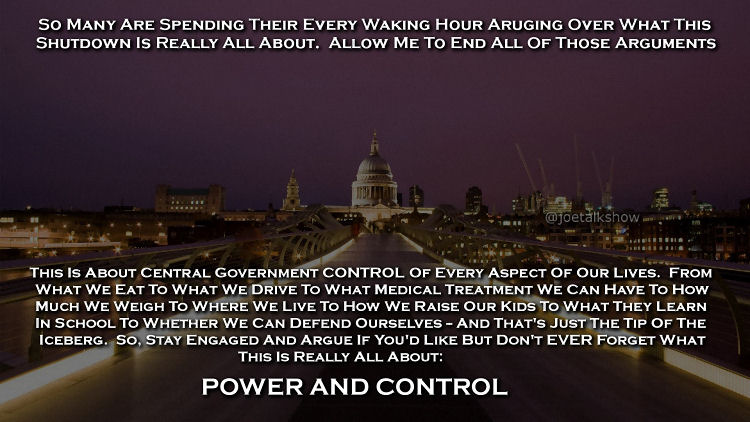
November 1793 Reign of Terror
"Jean Baptiste
Carrier, a wholesale executioner in the French Revolution, willing tool
of Marat whom this little misshapen hideous dwarf resembled in many ways
enrolled companies of criminals, negroes and mulattos, one of which was called
'The Company of Marat'.
Carrier butchered men, women and
children, chiefly of the peasant class, in wholesale drownings.
According to the estimate of one of Carrier's own committee 9,000
people, priests, peasants, and women with babies were herded into barges which
were taken out and sunk in the Loire.
Carrier's own declaration of the
intense joy he experienced in seeing his victims suffer are recorded at his
eventual trial after the downfall of Robespierre.
"I have never laughed
so much", he declared, "as when I saw the grimaces those priests made as they
died." - George Pitt-Rivers, 1920
After the fall of the Robespierre
government, Carrier, a member of the Jacobin Club, is tried for
war crimes, found
guilty and executed.
July 13, 1973
Jean-Paul Marat who heads the
Comité de Surveillance dies after
Charlotte Corday plunges a knife
into his chest.
The Committee of General Security (French:
Comité de sûreté générale) was a French
parliamentary committee which acted as police agency during the French
Revolution.
Along with the
Committee of Public
Safety it oversaw the Reign of Terror.
The Committee of
General Security supervised the local police committees in charge of
investigating reports of treason, and was one of the
agencies with
authority to refer suspects to the Revolutionary Tribunal for trial
and possible execution by guillotine.

1800 Rothschilds hire general
Napoleon Bonaparte of the
French Revolutionary Army to restore order.
The privately owned central
bank of France, is founded.
"The bankers owned its shares, and
even Napoleon himself bought shares in the bank." - Andrew Gavin
Marshall
Eventually Napoleon Bonaparte decides France has
to break free of debt.
Napoleon Bonaparte declares that when a government is dependent on
bankers for money, it is
bankers - not government leaders
- in control.
"The hand that gives is among the hand that
takes.
Money has no motherland, financiers are without
patriotism and without decency,
their sole object is gain." - Napoleon Bonaparte
A central bank is
granted a cartel charter
over the creation and distribution of the money supply and credit for a nation
or a group of nations.
A central bank formulates monetary
policy and regulates member banks.
Central banks are referred to as
"lenders of last resort."
Central banks provide
liquidity to critical nodes -
choke points - in monetary supply
chains allowing "smooth circulation" of
promissary
notes.
Private central
banks are joint stock incorporations.
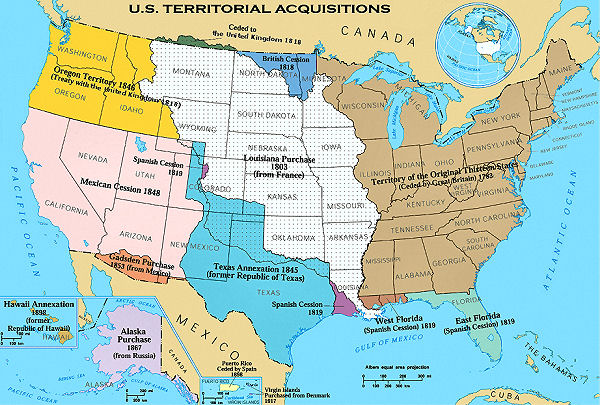
1803
Napoleon Bonaparte strikes a deal with
Thomas Jefferson,
the Louisiana purchase, exchanging the Mississippi basin for $3,000,000 in gold
which Napoleon Bonaparte uses
to hire an army for the Napoleonic Wars:
the War of the Third Coalition
(1805),
the War of the Fourth Coalition (1806-7),
the War of
the Fifth Coalition (1809),
the War of the Sixth Coalition (1813),
and the War of the Seventh Coalition (1815).
Before
industrilization military forces are organized around "foraging."
Soldiers interact with locals to acquire supplies in the conflict zone.
As they move
forward they strip the land to continue the forward march.
This is
how the Russian scorched earth policy worked to defeat
Napoleon.
Napoleonic Wars have lasting consequences for global and
European history.
They lead to:
the spread of
nationalism and
liberalism;
the rise of the British Empire as
the premier world power;
the independence
movements in Latin America;
the
collapse of the Spanish Empire;
the reorganization of
German and Italian territories into states;
and
the establishment of radically
new methods in warfare.
Land warfare becomes
dependent on mechanized travel.
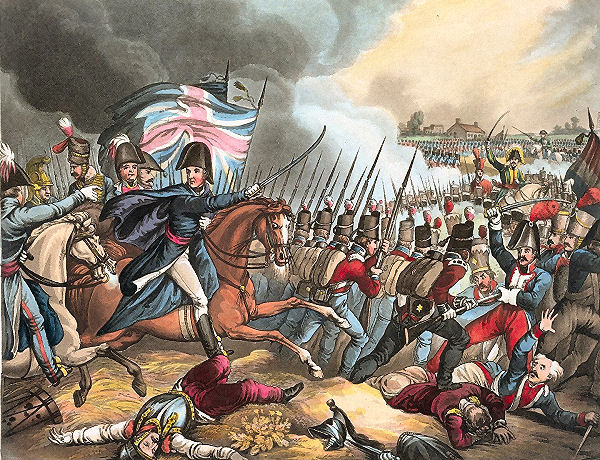
"If you will look back at every war in Europe
during the 19th Century, you will see they always ended with the establishment
of a 'balance of power.'
With every re-shuffling there was a balance of power in a new grouping
around the House of Rothschild
in England, France, or Austria.
They grouped nations so if any king got
out of line a war would break out and the war would be decided by the
financing." - Stuart CraneBank of England quickly rises
to oppose Napoleon Bonaparte and finances every nation in his path
profiteering off war.
Prussia,
Austria, and then finally
Russia all go heavily into debt to
City of London Money Power.
When
Napoleon falls, there
remained but one grand imperialism - the imperialism of concentrated wealth -
Money Power in the City of
London.
1810
William Brown establishes William Brown & Co. in
England.
1811 A bill is put before Congress to
renew the charter of the First
Bank.
The legislatures of both Pennsylvania and Virginia pass
resolutions asking Congress to kill the bank.
The national press openly
attacks the bank: a great swindle; a vulture; a viper; and a coiled
cobra.
"Either the application for renewal of the charter is granted, or
the US will find itself involved in a most disastrous war." -
Nathan Mayer Rothschild
The
renewal bill clears the House of Represenatives by a single vote and becomes
deadlocked in the Senate.
James Madison, a
staunch opponent of the First Bank, sends Vice-President, George Clinton, to
break the tie in the Senate which kills the central bank.
War of 1812
First Bank of the US charter is not
renewed and the British attack America.
As the British are still busy
fighting Napoleon Bonaparte they are unable to mount much of an assault and the
war ends with America undefeated.
1815 Napoleon Bonaparte escapes
exile and assembles an army which the Duke of Wellington defeats less than 90
days later at Waterloo.
Once the battle appears decided, Rothworth
crosses the Channel, and delivers the news of Wellington's victory to
Nathan Mayer Rothschild a full 24
hours before Wellington's own courier.
Nathan Mayer Rothschild hurries
to stand in the London Stockmarket.
All eyes are on Nathan as the
Rothschilds have a legendary communications.
Nathan Mayer standing
there looking forlorn suddenly starts selling.
The other traders have
been fooled into thinking that Napoleon Bonaparte has won so they all start
selling frantically.
The market subsequently plummets as everyone is
selling their Consuls (British Government Bonds).
Nathan Mayer
Rothschild secretly starts buying them all up through his agents on the floor,
for a fraction of what they were worth only hours before.
A lot of
these consuls are converted to Bank of England stock.
Nathan Mayer
Rothschild takes control of the Bank of England and the British money supply.
Nathan Mayer Rothschild
marries Hannah Barent-Cohen related by marriage to
Karl Heinrich Marx.
Nathan Mayer Rothschild openly
brags that in 17 years in England he has increased his initial
£20,000 stake given him by his father, 2500 times to £50,000,000.
British Treasury owes a debt of £ 885,000,000 due to the
compounding of interest to the Bank of England.
"Economics Professor
Stuart Crane notes that there are two means used to collateralize loans to
governments and kings.
Whenever a business firm borrows big money its
creditor obtains a voice in management to protect the investment.
No
government can borrow big money unless willing to surrender to the creditor
some measure of sovereignty as collateral." - Gary Allen
1818 John Brown establishes
John A. Brown & Co. in Philadelphia.
1825 James Brown establishes Brown Brothers &
Co. on Pine Street in New York.
1833 Brown Brothers &
Co. relocates to Wall Street.
Panic of 1837 Brown
Brothers withdraws from the lending business to focus on currency exchange
and international trade.
During the
Civil War Brown Brothers
ships carry 75% of the slave cotton from
the American South to British mill owners.
1848
Isaac-Jacob Adolphe
Crémieux is a French lawyer and politician serving as Minister of
Justice under the Second French Republic.
Adolphe Crémieux was
born in Nîmes to a wealthy Jewish family in 1796.
1861
Moses Taylor, Chairman of the
Loan Committee to finance the Union in the Civil War, offers the government
another $5,000,000 at 12% to continue financing the war by shaving 33% off
US treasury
bonds.
Colonel Dick Taylor of
Chicago suggests Abraham
Lincoln have Congress pass a bill authorizing
the printing of full legal tender
treasury notes.
Legal Tender
Act of 1862, allows the printing of $150 million Greenback with the US Treasury acting as the Bank.
"The government should create, issue and circulate all the currency and
credit needed to satisfy the spending power of the Government and the buying
power of the
people.
The
privilege of creating and issuing money is the supreme prerogative of
government and it is in the government's greatest creative opportunity.
Adoption of these principles will save taxpayers immense sums of
interest.
Money will cease to be master and become the servant." -
Abraham Lincoln
July 11, 1862 Second Legal Tender Act enacted
allows another $150 million Greenback to be
printed.
"If that mischievous financial policy, which had its origin in
the North American Republic, should become indurated down to a fixture, then
that government will furnish its own money without cost.
It will pay
off debts and be without a debt.
It will have all the money necessary
to carry on its commerce.
It will become prosperous beyond precedent in
the history of civilized governments of the world.
The brains and the
wealth of all countries will go to North America.
That government must
be destroyed or it will destroy every monarchy on the globe." - The Times of
London
November 15, 1862 A
letter from Napoleon III is
published proposing France, Britain, and Russia act as mediators in the
American conflict.
The Emperor cites three reasons for such an action
– the suffering of the American people, the harmful economic impact of the
war on Europe (notably the cotton crisis), and the seeming impossibility of the
two sides reaching a resolution quickly and independently.
December 17, 1862 General Order No. 11 decreed:
1. The
Jews, as a class violating every
regulation of trade established by the Treasury Department and also
department orders, are hereby expelled within twenty-four hours from the
receipt of this order.
2. Post commanders will see to it that all of
this class of people be furnished passes and required to leave, and any one
returning after such notification will be arrested and held in confinement
until an opportunity occurs of sending them out as prisoners, unless furnished
permit from headquarters.
3. No passes will be given these people to
visit headquarters for the purpose of making personal application of trade
permits."
"Sir,
…
they come in with their
Carpet sacks in spite of all that can be done.
The Jews seem to be
a privileged class that can travel any where.
They will land at any
wood yard and make their way through the country.
If not permitted to
buy Cotton themselves they will act as agents for someone else who will be at a
Military post, with a Treasury permit to receive Cotton and pay for it in
Treasury notes which the Jew will buy up at an agreed rate, paying gold …
all traders … a curse to the Army … expelled." - Ulysses S. Grant to
Christopher Wolcott, the United States Assistant Secretary of
War
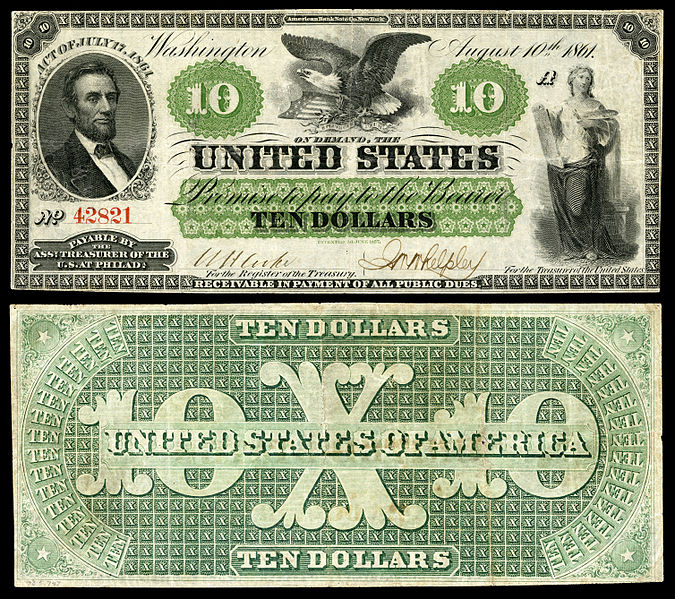
March 3,
1863 Third Legal Tender Act allows another $150 million
Greenback to be printed.
June 3, 1864 Abraham Lincoln, failing to garner congressional
authority to print more Greenback signs the
National Banking Act into law.
The North is
being financed by the Rothschilds through their American agent, August Belmont,
while the South is being financed through the Erlangers, Rothschild
relatives.
"The agents of the banks fell upon the bill in haste and
disfigured it." - Thaddeus Stevens
Tsar Alexander II states Russia
considers active British or French military action a declaration of war and
sends his Pacific Fleet to San Francisco.
Tsar Alexander II, like Otto
Von Bismarck, could see what the bankers were up to having already refused to
let them set up a central bank in
Russia.
Abraham Lincoln is re-elected.
"The money power preys
upon the nations in times of peace and conspires against it in times of
adversity.
It is more
despotic than monarchy, more insolent than autocracy, more selfish than
bureaucracy." -
Abraham Lincoln, November 21
"My agency in promoting the passage of the
National Banking Act was the greatest financial mistake in my life. It
has built up a monopoly which affects
every interest in the country." -
Salomon P
Chase
"While boasting of
our noble deeds we're careful to conceal the ugly fact that by an
iniquitous money system we have nationalized a system of oppression which, though more
refined, is not less cruel than the old
system of chattel slavery." - Horace Greeley
"Importers were obliged
to go to Wall Street to buy gold to pay duties on their goods, and the
Wall Street gamblers held the
power to fix the price.
Gold went to a
premium.
Had the greenbacks been permitted to retain their full
legal tender quality, there would have been no need for gold to pay import
duties.
The price of gold rapidly rose and before the war closed had
reached the price of $2.85, measured in greenbacks.
Thus during the
entire war these gold
gamblers speculated in gold, making fortunes from
the blood and tears of the
American people.
This 'sacred war debt' was only a gigantic of
fraud, concocted by European capitalists and enacted into American law with the
aid of congressmen, who were their paid hirelings or their ignorant dupes." -
Mrs ME Hobart
April 9, 1865 Confederate General
Robert E. Lee surrenders his Army of Northern Virginia, marking a symbolic end
to the Civil War.
The Night They Drove Old Dixie Down
April 15,
1865
Abraham
Lincoln is assassinated by John Wilkes Booth, at Ford's Theater.
Allegations that international bankers were responsible for Lincoln's
assassination surfaced in the Canadian House of Commons in 1934.
Gerald
G. McGeer obtained evidence deleted from the public record provided by Secret
Service agents that stated John Wilkes Booth was a
mercenary working for
Rothschild.
"They were the men opposed to his national currency
program and who had fought him throughout the whole Civil War on his policy of
the Greenback.
They were the men
interested in the establishment of the Gold
Standard and the right of the bankers to manage the currency and credit
of every nation.
With Abraham Lincoln out of the way they were able to
proceed with that plan and did proceed with it in the United States.
8
years after Lincoln's assassination, silver was demonetized and the
Gold Standard set up in the US." - Gerald G.
McGee, Vancouver Sun, May 2, 1934
"During the Civil War the
conspirators launched the first concrete efforts.
We know that Judah
Benjamin, chief advisor of Jefferson Davis, was a Rothschild agent.
We
also know that there were Rothschild agents planted in Abraham Lincoln's
cabinet who tried to sell
him into a financial dealing.
Old Abe saw through the
scheme and bluntly rejected it thereby incurring the undying enmity of the
Rothschilds; exactly as the
Russian Tsar did
when he torpedoed their first League of Nations at the
Congress in
Vienna.
Investigation of the assassination of Lincoln revealed that
the assassin Booth was a member of a secret conspiratorial group. " -
Myron Fagan
The
soulless central bankers wanted the reinstitution of a central bank under their
control and an American currency backed by gold.
Gold was chosen as gold
had always been relatively scarce, was a lot easier to monopolize , than silver
- now plentifully found in huge quantities in Aspen, Caribou, Telluride and
Leadville Colorado, Virginia City Nevada and the Calico Mountains of
California.
Conspiracy Between Booth and Union Army to Assassinate
Lincoln
Did
Jefferson Davis Approve the Lincoln Assassination Conspiracy?
1866 Congress passes
the, "Contraction Act," which authorizes the
Secretary of the Treasury to contract the
money supply by retiring some of the Greenback in
circulation.
"The hard times occurring after the Civil War could have
been avoided if the Greenback legislation had
continued as Abraham Lincoln had intended.
Instead there were
a series of money panics, what we
call recessions, which put pressure on Congress to
enact legislation
to place the banking system under centralized
control. " - Theodore R. Thoren and Richard F. Walker
Congress passes the "Contraction Act."
The
money supply falls as currency
is withdrawn from circulation.
1866 ~
$1,800,000,000 in circulation - approximately $50.46 per capita
1867 ~ $1,300,000,000 in circulation - approximately $44.00
per capita
1876 ~ $600,000,000 in circulation -
approximately $14.60 per capita
1886 ~
$400,000,000 in circulation - approximately $6.67 per capita
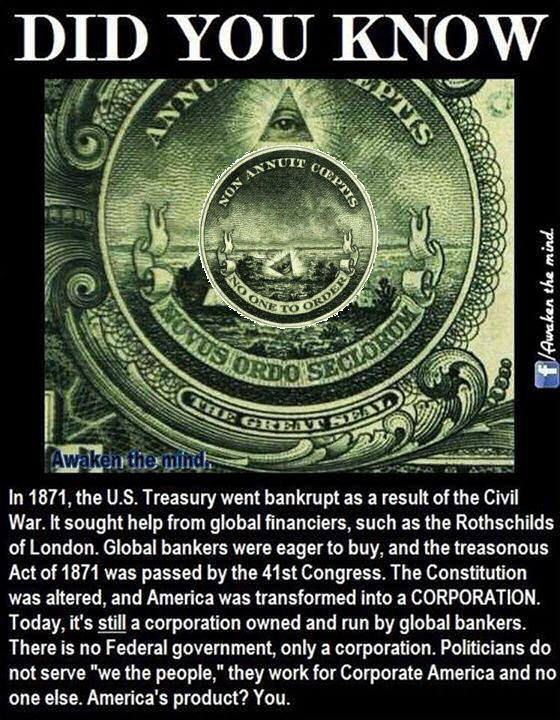
1872
Ernest Seyd appears in America with $100,000 to
bribe as many Congressmen as
necessary for the purposes of getting silver demonetized.
Ulysses S. Grant signs the
Coinage Act (H. R. 2934 written in 67 sections filling 35 pages of the
House Journal on May 27, 1872) which results in the minting of silver dollars
being abruptly stopped.
Representative Samuel Hooper, who introduced
the bill in the house, admits Ernest Seyd drafted the legislation.
Western mining interests and others who want silver in circulation
labeled this measure the "Crime of '73."
1873 "I went to America in the winter of
1872 - 1873, authorized to secure, if I could, the passage of a bill
demonetizing silver.
It was in the interests of those I
represented, the governors of the
Bank of England, to have it
done.
By 1873, gold coins
were the only form of coin money." - Ernest Seyd
1874 Russell Sage buys a seat on the New York Stock Exchange.
Sage secures stocks in smaller western railroads
Chicago,
Milwaukee and St. Paul
railways and becomes wealthy selling these to larger trunk lines.
Sage is closely associated with
Jay Gould in the management as a
director of the Wabash, St. Louis and Pacific, Missouri
Pacific, Delaware, Lackawanna, Missouri-Kansas-Texas,
Western and St. Louis-San Francisco railways.
Sage is also a
director of American Cable, Western Union telegraph and
Manhattan Consolidated system of elevated railroads in New York City.
1876
1⁄3 of
the workforce is
unemployed and unrest
is growing.
There are even calls for a return to
Greenback or silver.
Congress creates the
US Silver Commission to investigate the problem.
This commission
states that the deliberate contraction of the money supply created the current
"monetary crisis."
"The disaster of the Dark Ages was caused by
decreasing money and falling prices. Without money, civilization could not have
had a beginning, and with a diminishing supply, it must languish, and unless
relieved, finally perish. History records no other such disastrous transition
as that from the Roman Empire to
the Dark Ages." - US Silver Commission
Despite
this report no action is taken.
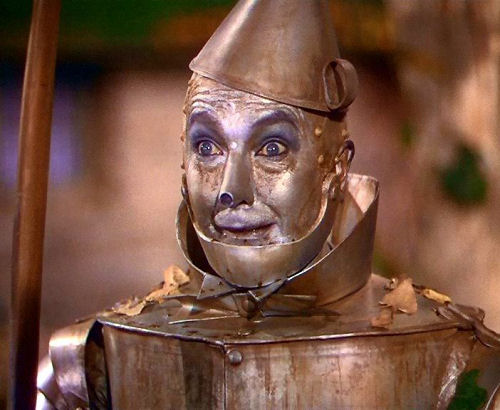
1877
Rioting breaks out from Pittsburgh to
Chicago.
American Bankers
Association urges membership to do everything in their power to put
down any notion of a return to Greenbacks.
The American Bankers
Association secretary, James Buel, writes a letter to the
members:
"It is advisable to do all in your power to sustain such
prominent daily and weekly
newspapers, especially the Agricultural and Religious press, as well as
oppose the Greenback issue of paper money and
withhold patronage from applicants who are not willing to oppose the government
issue of money.
To repeal the Act creating bank notes, or to restore to
circulation issue of money will be to provide the people with money and will
therefore seriously affect our individual profits as bankers and lenders.
See your Congressman at once and engage him to support our interests
that we may control legislation." - Secretary James Buel Associated Bankers of New
York, Philadelphia, Boston
1878 Congress
passes the Sherman Law.
This law allows the minting of a limited
number of silver dollars.
However this did not mean that anyone who
brought silver to the US Mint could have it struck into silver dollars, free of
charge, as in the period prior to Ernest Seyd's Coinage Act in 1873.
Gold backing of the
American currency also remains.
The Sherman Law ensures some
money begans to flow into the economy.
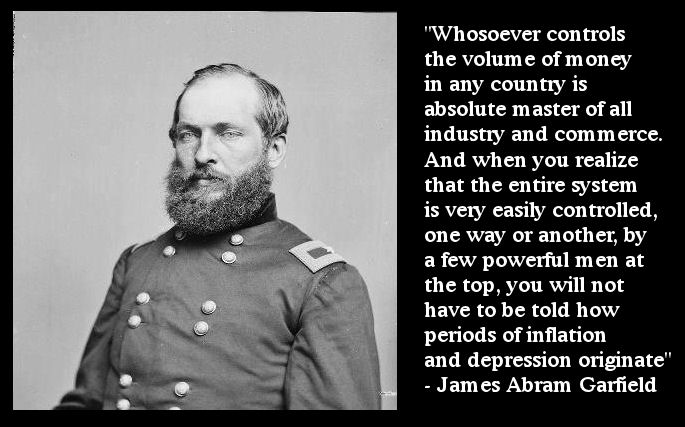
1881
James Abram Garfield, Chairman of the Appropriations Committee and a
member of Banking and Currency, is elected President.
"Whosoever
controls the volume of money in any country is
absolute master of all industry
and commerce.
When you realize that the entire system is very easily
controlled, one way or another, by a few powerful men at the top, you will not
have to be told how periods of inflation
and depression originate." - James Abram Garfield
July 2, 1881 James Abram Garfield is killed by Charles J.
Guiteau.
1892 "Let
us make use of the courts.
Let us go forward as fast as possible at
foreclosing on debts and mortgages.
Through the intervention of
law, the common people shall have
lost their homes, they will be more easy
to control and more easy to
govern.
They shall not be able to
resist the strong hand of the government acting in accordance with the
orders of the central power of imperial wealth.
Our top leaders are working at
establishing an imperialism of capital.
While they are implementing
this plan, they must keep the people busy with
political antagonisms." - United States Bankers' Magazine
1892
1893 "The year 1893 saw the biggest economic
crisis in the country's history. After several decades of wild industrial
growth, financial manipulation, uncontrolled speculation and
profiteering, it all collapsed: 642 banks failed and 16,000 businesses closed
down. Out of the labor force of 15 million, 3 million were unemployed." -
Howard Zinn
1894 "Were the Government to
establish banks as depositories for all the money in the country it is safe to
presume that nearly all the money in the country would come into these banks.
We cannot enumerate in an hour all the benefits of government ownership
of the banking system but you will recognize the following:
I. Absolute
safety of the bank as a place
for depositing money.
II.
Relief from anxiety to all
persons who deposit money in the banks.
III. The inducement for the
common people to acquire and save money that they may place it in the bank and
get 3 per cent interest on their
deposits.
IV. The
constant abundance of money in the bank by which any person can always borrow
who has security.
V. The absolute impartiality by which the poor can
borrow as cheaply as the rich, the man in Idaho borrow as cheaply as the man in
New York.
VI. Freedom from broken
banks, which precipitate the
financial panic, which shut down business, which starves out the laboring
man, which compels the poor to sell for what they can get in order to have
something to eat.
VII. Freedom from the hard times, resulting from bank
failures, in which period the rich take advantage of the poor, who are out of
work, to buy that which they are compelled to sell at a quarter of the value.
VIII. Freedom from the distressed conditions
from time to time in which the millionaire so rapidly doubles
and trebles his fortune.
IX. The abolition of the chattel mortgage
shark that gets his 5 per cent a month when banks are failing and money is
hidden.
X. The abolition of the loan broker who gets his living through
finding places where money can be borrowed during the continual period of hard
times.
XI. The settled financial conditions by which people can know
what to depend upon when they engage in business.
XII. The immense
revenue to the Government - a clear profit over and above all present means of
revenue.
XIII. Freedom from the expense borne by people who pay
annually hundreds of thousands of dollars to save manufacturers and the
proprietors of depositories for the custody of money in these hiding places.
XIV. The convenience and safety from
robbery of doing business with
checks instead of being compelled to carry money to use in business
transactions.
XV. The low rate of interest to borrowers by which the
money expended in interest can be saved and put into general circulation
instead of going into rich money loaner's hands at the great financial
centers." - Thomas E. Hill
1895 Supreme Court
finds an income tax law
unconstitutional.
1896 Central issue in the
Presidential campaign is issuance of silver money.
Senator William
Jennings Bryan from Nebraska makes an emotional speech at the Democratic
National Convention in Chicago,
labeled, "Crown Of Thorns And Cross Of Gold."
"We will answer
their demand for a Gold Standard by saying to
them, you shall not press down upon the brow of labor this crown of thorns,
you shall not crucify
mankind upon a cross of gold." - Senator Jennings Bryan
William McKinley favors the
Gold Standard.
Manufacturers and
industrialists inform
their employees that if William Jennings Bryan is elected
all factories and plants
would close.
William McKinley
beats William
Jennings Bryan by a small margin.
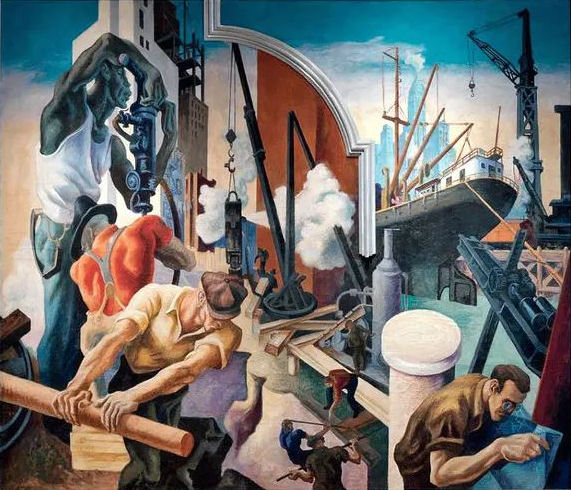
1898 Spanish-American War
ensues.
"On the one hand there is the
party which holds the power because it holds the wealth, which has in its grasp
all labor and all trade, which manipulates for its own benefit and its own
purposes all the sources of supply, and which is powerfully represented in the
councils of State itself.
On the other side there is the
powerless multitude, sore
and suffering.
Rapacious
usury, which, although more than once condemned by the Church, is
nevertheless under a different form but with the same guilt, still practiced by
avaricious and grasping men so that
a small number of very rich
men have been able to lay
upon the masses of the poor a yoke little better than slavery itself." -
Pope Leo XIII
The US annexes Guam,
the Philippine Islands, Puerto Rico
and gains temporary control over Cuba.
The Anti-Imperialist
League opposed annexation on economic, legal, and
moral grounds.
Propaganda identifies
William McKinley as an imperialist.
1900 William McKinley is re-elected with
foreign policy paramount.
William Jennings Bryan did not want war with
Spain, opposed the annexation of the
Philippines and campaigned for silver
money.
McKinley claims American product supreme in
global markets and after
the passage of the Gold Standard Act McKinley
easily wins re-election.
1901
Leon Frank
Czolgosz assassinates William McKinley.
Leon Frank Czolgosz is
influenced by the anarchists Emma
Goldman and Ovsei Osipovich Berkman, deported under the Anarchist
Exclusion Act.
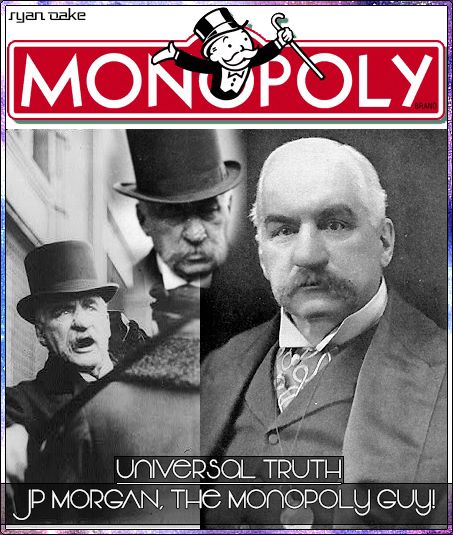
1907 Two stock market crashes occur.
In March 1907 and then again in October 1907 with the stock market
falling nearly 50% from its peak in 1906.
There were numerous runs on
banks and trust companies leading to the closings of many banks and
businesses.
Shortly before the Panic of
1907 Jacob Hirsch Schiff, the
head of Kuhn &
Loeb, speaking to the New York Chamber of Commerce:
"Unless we have a central bank with adequate control of credit
resources, this country is going to undergo the most severe and far reaching
money panic in its history." - Jacob Schiff
"If the Tsar will not accord our people desired
liberties, then a revolution will bring about a republic which will assure us
our rights." - Jacob
Schiff
John Pierpont Morgan, threatened by the developing trusts,
refuses to help Knickerbocker Trust which is experiencing a run on
deposits.
Charles T. Barney,
the president of Knickerbocker Trust, Charles Morse and his partners
Otto and Augustus Heinze, have failed in a
hostile takeover attempt of United
Copper .
October 21 National Bank of
Commerce announces it will stop accepting cheques from Knickerbocker
Trust and Knickerbocker Trust collapses.
October 23 New
York Times runs front-page article describing the run on
Knickerbocker Trust with a companion describing the Trust Company of
America, 2nd largest trust in New York City, as the current "sore point" in
the panic according to George W. Perkins, a senior Morgan
partner.
"Oakleigh Thorne testified before a congressional committee
that his bank had been subjected to only moderate withdrawals … that he
had not applied for help, and that it was the [Morgan's] 'sore point' statement
alone that had caused the run on his bank.
Morgan interests took
advantage of the unsettled conditions to precipitate the panic, guiding it
shrewdly as it progressed so that it would kill off rival banks and consolidate
the preeminence of the banks within the Morgan orbit." - Frederick Lewis Allen,
Life Magazine April 25, 1949
John Pierpont Morgan publicly
announces he will provide liquidity to the Trust
Company of America to stave off collapse.
John Pierpont Morgan
takes control of many smaller New York banks by manufacturing over $40,000,000
completely reserveless private money (fungible instruments), purchasing
goods & services and funding loans.
"Capital must protect itself in
every way.
Debts must be collected; loans and mortgages foreclosed as
soon as possible.
When through a
process of law
the common people have lost their
homes, they will be more tractable and
more easily governed by the
strong arm of the law applied by
the central power of leading
financiers.
People without homes will not
quarrel with their leaders.
This is well known among our principle
men are now engaged in forming an
imperialism of capitalism to govern the world.
By
dividing the people
we can get them to expend their
energies in fighting over questions of no importance to us except as
teachers of the common
herd." - John Pierpont Morgan
"A study of the panics of 1873,
1893, and
1907 indicates that these
panics were the result of the
international banker
operations in London." - Eustace Mullins
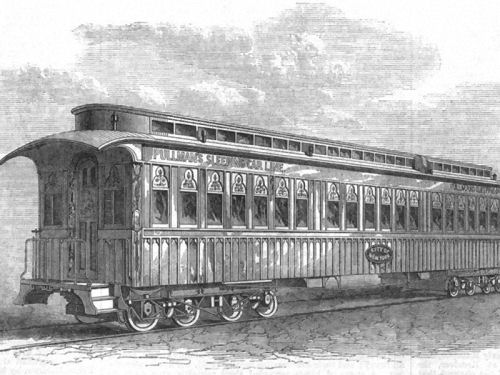
1908
Theodore Roosevelt
signs into law the National Monetary Commission.
This commission
is packed with friends and cronies of JP Morgan including chairman Senator
Nelson Wilmarth Aldrich representing America's richest banking families from
Newport, Rhode Island.
Nelson Wilmarth Aldrich's daughter Abby marries
John D. Rockefeller Jr.,
and together they have five sons including
Nelson, Vice President in 1974
and David who would become Head of the
Council on Foreign Relations.
Nelson Wilmarth Aldrich's son Winthrop Aldrich became chairman of the
Chase National Bank.
Following the setting up of this National Monetary Commission,
Nelson Wilmarth Aldrich immediately embarks on a 2 year 'fact finding' tour of
Europe, where he consulted at length with the central bankers in England,
France, and Germany, or rather Rothschild, Rothschild, and
Rothschild.
"Finance and the tariff are reserved by Nelson Aldrich as
falling within his sole purview and jurisdiction.
Mr. Aldrich is
endeavoring to devise, through the National Monetary Commission, a
banking and currency law.
A great many are firmly of the opinion that
Mr. Aldrich sums up in his personality the greatest and most sinister menace to
the popular welfare of the US." - Harper's Weekly, May 7,
1910
Shortly after Nelson Wilmarth Aldrich return the most wealthy and
powerful men in America board his private railcar in the strictest secrecy and
journey to Jekyll Island off the coast of Georgia.
In this group is
Paul Warburg who has
been lobbying for over five years for a privately owned central bank and Jacob
Hirsch Schiff who has recently purchased control of Kuhn & Loeb after
arriving in America.
The Rothschilds, Warburgs and Schiffs are
interconnected by
marriage.
Paul Warburg marries Nina Loeb, daughter of Solomon
Loeb.
Felix Warburg marries Frieda
Schiff, daughter of Jacob Hirsch Schiff.
Felix, Paul
and Max are sons of Charlotte
Esther (Oppenheimer) Warburg
and Moritz Moses Warburg.
Kuhn is a Germanized version of
Cohen.
"I was as secretive indeed,
as furtive as any
conspirator.
Discovery we knew, simply must not
happen, or else all our time and effort would be wasted.
If it were to
be exposed that our particular group had got together and written a banking
bill, that bill would have no chance whatever of passage by Congress." -
Frank Vanderlip, Saturday
Evening Post, February 9, 1935
"In the US today we have in effect
two governments.
We have the duly constituted Government.
Then
we have an independent, uncontrolled and uncoordinated government in the
Federal Reserve system, operating the
money powers which are reserved to Congress by the Constitution." -
Represenative Wright Patman, Chairman of the House Banking
Committee |
|
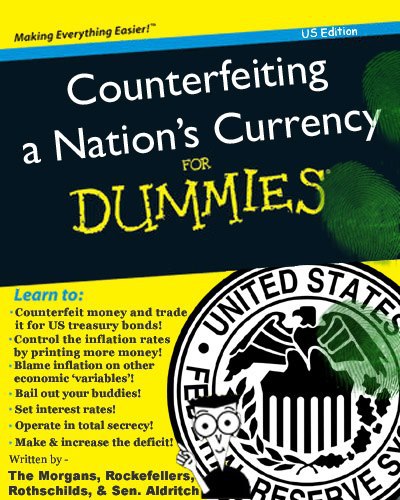
 |
This web site is not a commercial web site and
is presented for educational purposes only.

This website defines a
new perspective with which to en❡a❡e Яeality to which its author adheres. The
author feels that the faλsification of reaλity outside personal
experience has forged a populace unable to discern pr☠paganda from
reality and that this has been done purposefully by an
internati☣nal c☣rp☣rate
cartel through their agents who wish to foist a corrupt Ѵersion of Яeality
on the human race. Religi☯us int☯lerance ☯ccurs when any
group refuses to tolerate religi☯us practices, religi☸us beliefs or
persons due to their philosophical ideology. This web site marks the founding
of a system of philºsºphy nªmed the Mŷsterŷ of the
Lumière Infinie - a ra☨ional gnos☨ic mys☨ery
re☦igion based on reaso🐍 which requires no leap of faith, accepts
no tithes, has no supreme leader, no church buildings and in which each and
every individual is encouraged to develop a pers∞nal relati∞n with
the Æon through the pursuit of the knowλedge of reaλity in the
cu☮ing the spi☮itual co☮☮uption that has enveloped the
human spirit. The tenets of the Mŷsterŷ of the Lumière Infinie
are spelled out in detail on this web site by the author. Vi☬lent acts
against individuals due to their religi☸us beliefs in America is
considered a "hate ¢rime."
This web site in no way
c☬nd☬nes vi☬lence. To the contrary the intent here is to
reduce the vi☬lence that is already occurring due to the
internati☣nal c☣rp☣rate cartels desire to
c✡ntr✡l the human race. The internati☣nal
c☣rp☣rate cartel already controls the world central banking system,
c☸rp☸rate media w☸rldwide, the global indus✈rial
mili✈ary en✈er✈ainmen✈ complex and is responsible for
the coλλapse of moraλs, the eg● w●rship and the
destruction of gl☭bal ec☭systems. Civilization is based on
coöperation. Coöperation with bi☣hazards of a
gun.
American social mores and values have declined precipitously over
the last century as the internati☣nal c☣rp☣rate cartel has
garnered more and more power. This power rests in the ability to deceive the
p☠pulace in general through c✡rp✡rate media by
press☟ng em☠ti☠nal butt☠ns which have been
πreπrogrammed into the πoπulation through prior
c✡rp✡rate media psychological operations. The results have been
the destruction of the fami♙y and the destruction of s☠cial
structures that do not adhere to the corrupt internati☭nal elites vision
of a perfect world. Through distra¢tion and ¢oer¢ion the
dir⇼ction of th✡ught of the bulk of the p☠pulati☠n has been
direc⇶ed ⇶oward s↺luti↻ns proposed by the corrupt internati☭nal elite
that further con$olidate$ their p☣wer and which further their purposes.
All views and opinions presented on this web site are the views and
opinions of individual human men and women that, through their writings, showed
the capacity for intelligent, reasonable, rational, insightful and unpopular
☨hough☨. All factual information presented on this web site is believed to be
true and accurate and is presented as originally presented in print media which
may or may not have originally presented the facts truthfully.
Øpinion and ☨hough☨s
have been adapted, edited, corrected, redacted, combined, added to, re-edited
and re-corrected as nearly all opinion and ☨hough☨ has been throughout time but
has been done so in the spirit of the original writer with the intent of making
his or her ☨hough☨s and opinions clearer and relevant to the reader in the
present time.
Fair Use Notice

This site may contain
copyrighted material the use of which has not always been specifically
authorized by the copyright owner. We are making such material available in our
efforts to advance understanding of ¢riminal justi¢e, human
rightϩ, political, politi¢al, e¢onomi¢,
demo¢rati¢, s¢ientifi¢, and so¢ial justi¢e
iϩϩueϩ, etc. We believe this constitutes a 'fair use' of any
such copyrighted material as provided for in section 107 of the US Copyright
Law. In accordance with Title 17 U.S.C. Section 107, the material on this site
is distributed without profit to those who have
expressed a prior interest in receiving the included information for research
and educational purposes. For more information see:
www.law.cornell.edu/uscode/17/107.shtml. If you wish to use copyrighted
material from this site for purposes of your own that go beyond 'fair use', you
must obtain permission from the copyright owner. |
 Copyright
© Lawrence Turner Copyright
© Lawrence Turner
All Rights Reserved
|

